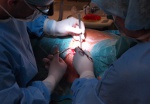 A new study released by Merck found that while surgeons, anesthesiologists and nurse anesthetists are generally satisfied with the level of collaboration and communications between members of their surgical team, more communication can lead to enhanced collaboration in the work environment. Ninety-three percent of anesthesiologists and 86 percent of nurse anesthetists reported communication with surgeons impacts their ability to manage the anesthesia plan to some degree and 88 percent of surgeons said communication with anesthesiologists makes an impact on how they manage the surgical procedure.
A new study released by Merck found that while surgeons, anesthesiologists and nurse anesthetists are generally satisfied with the level of collaboration and communications between members of their surgical team, more communication can lead to enhanced collaboration in the work environment. Ninety-three percent of anesthesiologists and 86 percent of nurse anesthetists reported communication with surgeons impacts their ability to manage the anesthesia plan to some degree and 88 percent of surgeons said communication with anesthesiologists makes an impact on how they manage the surgical procedure.
The report found that anesthesiologists and surgeons felt several strategies and tools could be effective in improving communication and collaboration, including:
• The surgeon's understanding of the anesthesia plan;
• The anesthesiologist's understanding of the surgical plan;
• Agreement on the overall anesthesia plan before surgery starts;
• Checklists of the guidelines streamline communication at all stages of operation.
David Stein, MD, OR Xchange expert and associate professor and chief of the division of colorectal surgery at Drexel University College of Medicine, discusses five ways to improve that communication and make patient care better in the operating room.
1. Take a team huddle and time-out before every case. Time-outs before surgical procedures are now standard across the country to ensure everyone understands the plan. The surgical team should huddle before the case to discuss their plan and then take a time-out right before the surgical procedure begins for a final check.
"Everyone is involved in the time-out and makes sure they know what they're doing," says Dr. Stein. "The process is now more formalized. As good as that is, there are still certain deficiencies and anesthesiologists should make sure they understand the patient will be under general anesthesia, how long the case will be and expectations for the procedure. The time-out system is a nice way for everyone to introduce themselves."
2. Communicate constantly during the procedure. Surgeons and anesthesiologists should make a conscious effort to communicate throughout the surgery, especially if something changes half way through. Surgeons and anesthesiologists should verbalize their actions to make sure everyone knows the patient's status.
"If all of a sudden there is a bleeding, tell anesthesia colleagues what has happened and make sure to get blood into the room to stabilize the patient," says Dr. Stein. "It's events like that where you still need constant communication. The old culture was that anesthesia was in charge of the head and airway, and surgeons in charge of the surgery, and they worked in silos. However, with a drive for better outcomes and minimal complications, we need to focus more on communication."
3. Ask anesthesiologists if they are concerned about anything. During the procedure, surgeons should ask the anesthesiologists a few times whether there are any concerns about the patient.
"This engages the anesthesiologist and if they do have a worry, they can toss it back to the surgeon," says Dr. Stein. "It stimulates dialogue and once you have a dialogue you can anticipate an event. Instead of a complication being an event, it becomes a near miss."
4. Take the team approach to every case. Traditionally surgeons have been leaders of every case with other members of the surgical team taking their orders. However, today's culture demands a more collaborative effort with checks and balances for the different authorities in the operating room.
"Realize that in this day and age, it's not just the surgeon who is the captain of the ship," says Dr. Stein. "You need to have a team approach. If you look at major airplane disasters, they often occur because the second in command was afraid to speak. Surgeons have to realize anesthesiologists may be inhibited from speaking up. Empower the anesthesia team by initiating a dialogue and discussing issues."
5. Strive for perfection. Legendary football coach Vince Lombardi used to say if you chase perfection, you can catch excellence. This mentality can translate into the operating room to minimize complications and maximize outcomes.
"There can always be a complication, but if you've done everything right you can still get an excellent outcome," says Dr. Stein. "That's what separates high-quality from average care."
More Articles on Surgery Centers:
8 Tactics to Strengthen Surgery Center Physician Credentialing
Strategy for ASCs to Acquire Advanced Equipment Without Breaking the Bank
5 Tips to Build Physician Loyalty at Your Surgery Center

